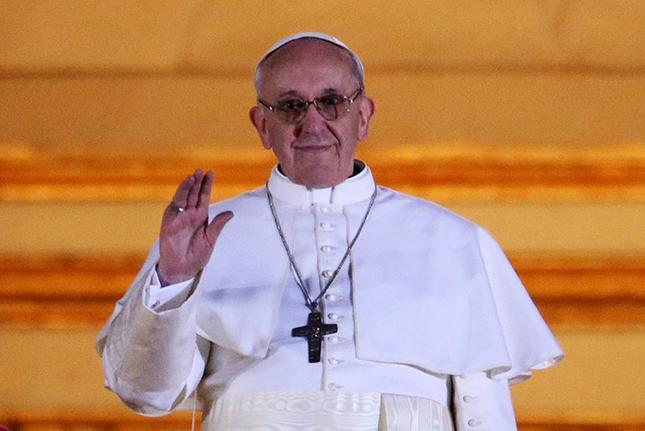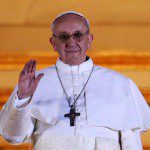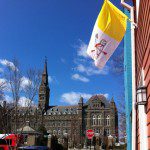Francis I: the Irony of a Jesuit Pope
By • July 29, 2015 0 2511

“I announce to you a great joy,” said the church official. “Habeus papam . . .” We have a pope: the 266th, once known as Cardinal Jorge Mario Bergoglio, Archbishop of Buenos Aires, he is now Pope Francis I.
Francis. A simple name. A holy and humble man, who enthusiastically ministers to the poor. A scientist. A surprising choice, the new pope represents several firsts: the first Francis, first pope from the Americas, first from South America, which has the most Roman Catholics of any continent, first non-European in more than 1,000 years and first Jesuit.
That last first on the list — “Jesuit,” the nickname for a member of the Society of Jesus, a religious order founded in 1540 by St. Ignatius Loyola, is fraught with irony. Yes, the Jesuits usually are not in official church leadership roles, and, yes, the Jesuits vow onto death absolute obedience to the pope. They are renowned for their schools and missions. They were set up as a group to be soldiers of Christ and to lead the Catholic Counter-Reformation, fighting the spread of Protestantism.
They became very good at what they did — so much so that the pope dissolved the order in 1773, after other nations had already begun to kick them out, accusing them of excessive influence.
The suppression of the Jesuits is a complex tale of national jealousies, betrayal and greed along with confiscated property, banished missionaries and lost souls. The order was restored in 1814 by Pope Pius VII.
Indeed, the oldest Catholic institution of higher learning in the United States, Georgetown University, could not formally begin as a Jesuit college in the future Washington, D.C. — but ex-Jesuits, known as “the Christian Brothers of Maryland,” signed the deed. Georgetown University was founded in 1789 by Archbishop John Carroll, ordained in Europe as a Jesuit priest. The Society of Jesus was protected in Russia by Catherine the Great, who did not enforce the papal ban.
Today, the Georgetown campus is justly proud of the new pope, a Jesuit.
“Yesterday was a day of great joy for Georgetown as the nation’s oldest Catholic and Jesuit university,” said Rev. Kevin O’Brien, S.J., Vice President for Mission and Ministry of Georgetown University. “In the election of Francis, the cardinals for the first time have given the Church a pope steeped in the Jesuit tradition and with Latin American roots. With this background, Francis will bring a different style or way of proceeding to the office. His name, ‘Francis,’ reminds the Church of a simplicity of life focused on the gospel and on service to the poor, as St. Francis of Assisi was devoted to. St. Francis was also committed to renewing spiritually the church of his time. Hopefully, our Francis will do the same for our Church today.”
“This is an historic moment for our Church and for our community that the first Jesuit and the first cardinal from the Americas has become pope, the leader of our global community of believers,” said John DeGioia, President of Georgetown University. “Our work at Georgetown is informed by the spirituality of St. Ignatius Loyola, the founder of the Jesuit order. This very same tradition played an essential role in the formation of our new pope, and we have seen it expressed in his preference and care for the poor, his vow of poverty, and his ministry as Archbishop of Buenos Aires. We are grateful to share this spiritual affinity with our new pontiff.”
Amid the many commenters on television last night, Democratic strategist Donna Brazile — and teacher at the university — said on CNN that Georgetown students were excited about the selection.
Maybe during a future visit, this pope will stop by Georgetown, seen by some Catholics as too liberal.
The other Jesuit connection in Georgetown is Holy Trinity Church, a block from the university; it is a Jesuit parish. Nearby are the Jesuit prep schools: Gonzaga College High School on North Capitol Street and Georgetown Prep in North Bethesda.
While the new pope appears to have chosen “Francis” for Francis of Assisi, the patron saint of animals and a special saint for Italy, Georgetown history professor, Rev. David Collins, S.J., would like to add two other Francises: St. Francis Xavier, the Jesuit missionary who traveled from India to Japan, and St. Francis de Sales, devout bishop of Genoa.
This pope — Jesuitical in his thinking, balancing the practical with the spiritual — has entered a wider world, something Jesuits do well. His cardinals toasted him during the first night of his papacy, according to the Vatican. Pope Francis I wryly responded: “May God forgive you for what you have done.”
- Cardinal Jorge Mario Bergoglio, Archbishop of Buenos Aires is now Pope Francis I.
- Photo by Robert Devaney



